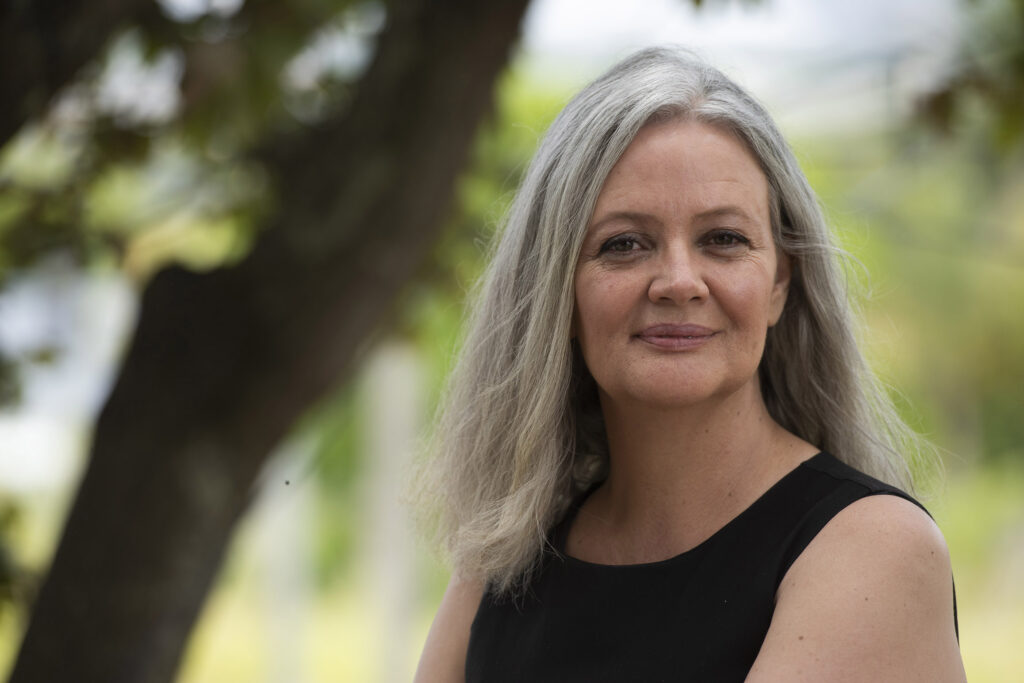For those in peril: Social worker Unathi Ngxambuza works for the National Shelter Movement of South Africa from the Saartjie Baartman Centre together
with NSMSA team leader Bernadine Bachar. (David Harrison/M&G)
On 2 December, in the early hours of the morning, a call comes through to a small, bare office in the Saartjie Baartman Centre for Women and Children in Cape Town. A woman with an abusive partner is in danger and needs help. The social worker on duty identifies a place that’s available at a nearby shelter and quickly arranges for a taxi driver to meet the woman and take her to safety.
The National Shelter Movement of South Africa (NSMSA) connects victims of domestic violence directly with shelters. More than 200 calls from around the country have come in since the movement opened on 2 December.
Social worker Unathi Ngxambuza says she gives people information and options, such as opening a criminal case, getting a protection order or going to a shelter.
“It’s touching because when those callers are calling, they sound so emotional, they sound helpless, they sound betrayed by their partners,” she says.
“They don’t know what to do. They need help. They don’t know the information. That’s why we’re here.”
More than one in four adult women in the country who have had partners have experienced physical, sexual or emotional violence, according to the 2016 South Africa Demographic and Health Survey.
A 2018 analysis by Statistics South Africa of previous Victims of Crime Survey data estimates that only 9% of households know about domestic violence shelters or other resources.
The NSMSA, which was launched with support from the Ford Foundation, wants to collaborate with existing helplines such as the government’s Gender-Based Violence Command Centre.
Advocate Bernadine Bachar, the team leader of the NSMSA helpline and an executive committee member of the movement, says their service fills a particular gap by focusing on how to go to places of shelter and related information.
According to the national minimum standards on shelters for abused women, shelters represent a critical point of crisis intervention.
 NSMSA team leader Bernadine Bachar. (David Harrison/M&G)
NSMSA team leader Bernadine Bachar. (David Harrison/M&G)
“They serve as a ‘home’, a safe space when women and children are extremely vulnerable. They are, therefore, a crucial base of information on the extent to which the legal system is effective in protecting the enormous amount of women seeking such protection,” reads the department of social development’s document.
Bachar says they had expected a substantial increase in shelter occupancy during the beginning of the hard lockdown earlier this year, but this initially didn’t happen. This made the NSMSA realise that South Africans experiencing domestic or gender-based violence — as well as police officers — were often not aware of shelters or how to reach places of safety. Furthermore, the chain of referral was tedious or unclear, which led to delays in people getting help.
“So it became obvious that this was a service that was needed, that it was one of the ways that we could make sure, from the start, from the ground, we could assist women and that there weren’t all these middlemen in between,” according to Bachar.
Because the NSMSA works closely with shelters and monitors their capacity, it can quickly place survivors and avoid mix-ups regarding which facilities take in different categories of victims such as pregnant women or teenage boys.
Kim Pillay, the programme manager at New World Foundation that operates in Cape Town’s Lavender Hill and surrounding areas, which are subject to gang and other forms of violence, says that some of the survivors at their facility seem surprised by the swift response and support from the NSMSA.
“The helpline is a lifeline, making a difference of life or death if the victim gets help in time and can make it into a shelter where the swift and expert response by the helpline social worker is key,” she says.
Even though the NSMSA is in its first month of operations, Pillay says the helpline has already meant that the foundation’s facility is often at capacity.
Bachar says that of the 17 shelters in the Western Cape, only four currently have open beds and she puts this down to the NSMSA helpline.
“We noticed a definite uptick in women coming looking for shelters almost immediately after we launched.
“It’s just basic information that women are now getting about what shelters are about,” she says, adding that they will soon need to expand their team of three social workers.
Mary’s story
Mary* is now in a shelter after leaving an abusive relationship of 11 years. She entered the shelter on the advice of her sister after her partner had told her to leave and her family members did not want her and her children to once again return to them.
Mary, who was using drugs, says she had heard of such helplines
but had never used them because she was previously closed off to accepting help when she needed support.
“I can speak from experience for those that are in that situation now. Phone for help, ask for help, because you’re never going to get out, your life is never going to change until you ask for help.
“So, use the hotline, use whatever information you have, use it to the best of your ability,” she advises.
* A pseudonym
Contact the NSMSA helplineby calling 0800 001 005, sending an email to infohelpine@womenscentre.co.za, or an SMS, WhatsApp or Please Call Me to 082 057 8600, 082 058 2215 or 072 230 7147